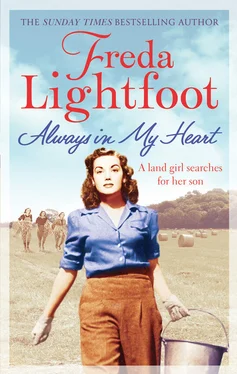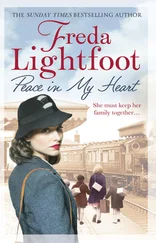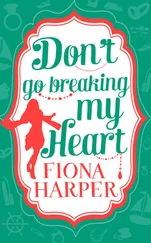Perhaps the poor lady also felt a certain fear in living alone, as did everyone these days.
If Adèle decided to stay on, Brenda thought she might try once more to return home to England, although she really had no idea how that could come about. In the meantime she must concentrate upon keeping in good health. Her pregnancy seemed endless, and due to the shortage of food, not at all easy. But she could not wait to hold Jack’s child in her arms.
*
The situation worsened considerably in the months following Jack’s death. Paris became a different place. Coupons were needed for bread, meat, groceries, clothes, coal, everything. And they became increasingly hungry and cold. Each day Brenda would join other local Parisians in the public squares to search for any scraps of wood she could find to burn. Since the apartment had no open fire or chimney and they’d run out of gas, she made a brazier from an old tin that provided a small amount of heat, the smoke dispensed through a pipe that ran out of a nearby window.
Every street, including the beautiful Plâce de Concorde, the Eiffel tower and all public buildings, bristled with swastika flags. There were posters depicting John Bull as a killer, among many other anti-British images. Signs that gave directions in German with barely a word in French visible. And the sound of goose-stepping boots was everywhere.
On visiting the British Embassy, Brenda found that it was indeed closed. Even the skeleton staff present at the start of the occupation had departed south. According to reports the borders into Spain were also kept largely barricaded. Trains to England were still not available. Sending a letter to England was also a problem as they were generally blocked. It was very evident that finding a way out of France would be almost impossible.
She felt trapped.
Many other women were too: dancers, singers, nurses and governesses, rich ladies who loved to spend their time travelling around Europe. Even French widows who had married Englishmen were likewise looked upon as outcasts. The German hatred of the British was all too evident. People without the right documentation or who were Jewish tended to hide away, desperate to avoid being imprisoned or shipped to Germany. Some would be arrested simply for listening to the BBC. A dreadful prospect.
Brenda gave birth to a son on 27 November, less than a month from her own birthday, which helped to ease the dark pit of anguish devouring her. The two ladies took good care of her and all went well. How fortunate she was. She would sit and gaze in wonder at his tiny fingers and toes, the soft pale baby-blue eyes, and the way his sweet lips pursed or smacked together whenever he was hungry. He was utterly adorable. She spent every moment of every day bathing, feeding and nursing him, and tucking the little fellow into his crib cuddled up with the silver-grey fluffy monkey she’d bought for him just before his birth.
Now it was Adèle doing all the cooking, cleaning and shopping, running up and down stairs, fetching and carrying, without a word of complaint. Even Camille did what she could to help, despite her rich, aristocratic heritage and fragility.
‘I do appreciate the care you’ve both given me. Being illegitimate, I was born in a home for unmarried mothers,’ Brenda said, giving a wry smile. ‘So I have no family of my own.’
‘Goodness, I didn’t know that,’ Adèle said, looking slightly surprised by this news.
‘The nuns were extremely good to her. Did you ever find out who your mother was?’ Camille asked.
Brenda shook her head. ‘I don’t even know her name. I was given the surname Noel by the nuns because I was born just five days before Christmas.’ She really had no wish to find her mother, and still nursed a deep resentment at having been abandoned at birth. It was a most cruel and unfeeling thing for any mother to do. Brenda certainly had no intention of ever abandoning her own child. He was already the joy of her life.
‘Never mind, darling, you have a family now,’ Camille said, giving her a hug.
‘You do indeed,’ Adèle agreed. ‘We love you and this little baby. What are you going to call him?’
‘I can’t decide. Should it be Jack? Certainly not Randall, or that would remind us forever of this dratted war. What was your father called?’ she asked Camille.
She smiled. ‘Unlike my mother, he was English, and called Thomas.’
‘Oh, I like that. Thomas it is, then. Although I shall probably call him Tommy.’
Three
1944
It felt strange to be back in England, her nervous tension still very evident, churning her stomach. At least Brenda no longer needed to speak French, and according to the latest news, France was now in the process of being liberated. De Gaulle had led a procession of the Free French down the Champs-Élysées. The Allies were also starting to arrive, including the British, the American and the Canadians. The war at last seemed to be drawing to an end. Would that help her to resolve her own problem?
The warmth of the big farm kitchen offered a small degree of comfort. The familiarity of the stove, the clutter of old chairs, Tiddles the cat rubbing against her leg, and the chink of the old flowered tea pot and mugs they’d used when she was but a girl were all still in evidence. As was Mrs Harding, the housekeeper, who pretty well ran this house. Busy rolling out pastry, she glanced up as Brenda entered, her eyes widening in surprise. ‘By heck, it looks like a bag o’ muck has just walked in.’
Brenda chuckled, accepting this comment as typical evidence of the cook-housekeeper’s Lancashire sense of humour. She had always been good to work for. ‘I dare say I do after such a long journey in this dreadful weather.’
Mrs Harding’s faded old eyes softened. ‘Eeh, and you’re soaked to the skin, chuck.’
‘I’m afraid so.’
‘Would you like a cup of tea?’
‘Oh, that would be lovely, thank you,’ Brenda warmly responded. She could remember enjoying the cook’s homemade biscuits kept in a jar on the dresser, a treat she would also welcome right now, judging by the ache in her belly. Brenda moved to seat herself at the big pine table but Hugh stepped quickly forward to block her way.
‘Take off your filthy boots, then come upstairs with me,’ he ordered in brisk, no-nonsense tones. ‘You said we needed to talk.’
Brenda made no attempt to argue but did as she was told. Setting her boots on the mat by the back door, she dutifully followed him in her stockinged feet. But, expecting to be led into the drawing room, she was startled to be shown instead into Sir Randolph’s study. Parking himself in the large chair behind the desk, he turned to glower at her with narrowed eyes, arms firmly folded across his broad chest. He looked very like his elder brother, save for the sour expression on his handsome face, which Brenda found most disconcerting.
‘What were you hoping to achieve by coming here?’ he snarled, not even offering her a seat. ‘Considering you are illegitimate, you were most fortunate to be given a job, thanks to the kindness of my mother. You then lured my brother into your bed and ran off with him. Had you not behaved so stupidly, he would still have been alive. So why on earth would I allow you to stay, in view of how you completely destroyed his life?’
Brenda stood rigid before him, still clutching her heavy bag, her wet hair dripping down the neck of her blouse. A shiver ran down her spine as she struggled to keep her temper in check. ‘We fell in love. What is so wrong with that? Your father found us kissing out in the woods, not in bed together. It was his decision to banish us from the house, and Jack’s that I go with him to France. Since I loved him, why would I not agree? We were very happy together, and I still do love him with all my heart. Losing him has been utterly devastating.’
Читать дальше











